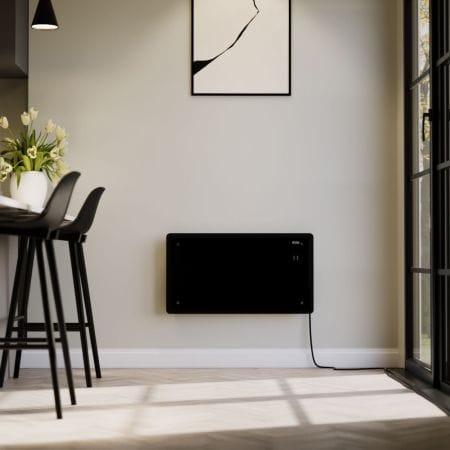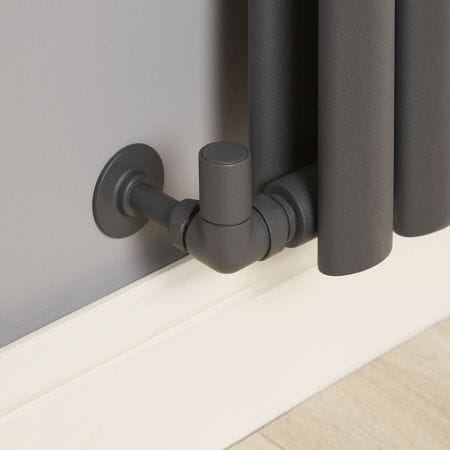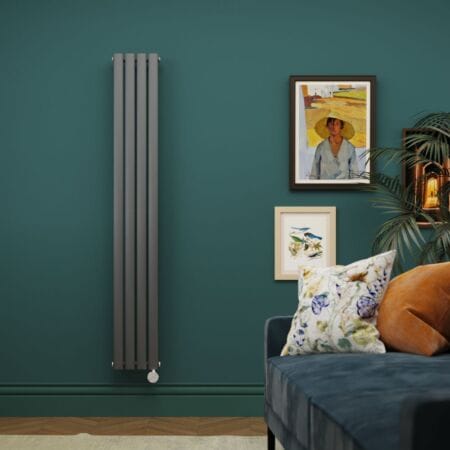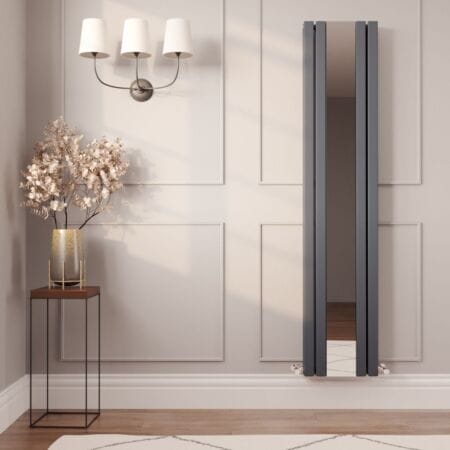Contents
ToggleWhat we'll cover...
The key differences in the ground source vs air source heat pumps battle, including how each system works, what installation involves, upfront and running costs, long-term efficiency, and the pros and cons of both options. We’ll provide a clear insight into which type of heat pump is best suited to your home, lifestyle, and budget.
Understanding ground source and air source heat pumps
When looking into renewable home heating options, ground source and air source heat pumps are sure to be one of the solutions at the forefront of your thinking. Each promise decreased running costs, lower carbon emissions and a future-proof heating system without requirement for a gas boiler. But which type would be best suited to your property?
We already have resources around pairing radiators with heat pumps and what you need to know about HVAC systems. But further to those topics, this article will explore the key difference between ground and air source heat pumps, touching upon installation needs and attributes, potential outlays for fitting, running and maintenance, energy efficiency and durability, as well as the pros and cons of each kind.

Ground source and air source: What's the difference?
Each system largely works in the same way: they extract heat from the environment and pump it into the home for hot water and heating. The difference lies in where they retrieve that heat from.
Ground source heat pumps (GSHPs)
Ground source heat pumps absorb heat from the ground through buried pipework or boreholes. Soil remains at a fairly stable temperature all year round, so they deliver consistent efficiency even in the colder winter months.
Air source heat pumps (ASHPs)
An air source heat pump will take heat from the outdoor air, even on cooler days. They are the easier of the two types to install, but can be affected slightly more by seasonal temperatures.
To break it down into table form…
Feature | Ground Source Heat Pump | Air Source Heat Pump |
Heat source | Ground (soil) | Outside air |
Seasonal efficiency | High, stable year-round | Slightly lower in winter |
Installation complexity | High – needs land or boreholes | Low – outdoor unit only |
Space requirement | Large garden or borehole drilling | Small outdoor unit |
Typical lifespan | 20–25 years | 15–20 years |
Initial cost | £15k–£30k | £8k–£15k |
Source: The Guardian, Checkatrade, GreenMatch, Heat Pump World
Heat pump installation
Ground source heat pump installation
Installing a GSHP is not a straightforward weekend DIY project. It will typically involve:
- Groundwork – digging horizontal trenches or drilling deep vertical boreholes in the ground.
- Pipework – fitting a network of ground loops to collect heat from the ground.
- Internal unit – connecting the ground source heat pump to underfloor heating or radiators.
- Timeframe: Usually between one and three weeks, depending on the groundworks.
- Property types: Best suited to rural homes with plenty of outdoor space for the necessary groundwork to commence.
- Disruption level: High – expect some muddy landscaping before the job is completed.
Air source heat pump installation
Air source heat pumps are far simpler to install in comparison:
- Outdoor unit – a box roughly the size of an air conditioning unit to be mounted outside, either on the floor or as a wall attachment.
- Indoor unit and buffer tank – connects to your heating and hot water system.
- Timeframe: Between two and five days.
- Property types: Suitable for most homes with a small outdoor space.
- Disruption level: Low – no need to dig up the garden to get the job done.
If you own a listed property or a tight urban space, air source is likely to be your only option. GSHPs shine in new builds or homes with big gardens.

Heat pump costs
The cost could be a deciding factor in which type of heat pump you decide to install. On the face of it, ground source heat pumps are more expensive to purchase and install up front but cheaper to run over time, while air source heat pumps are more accessible but slightly less efficient, operating at 300% efficiency levels in comparison with the 400% that ground source versions can deliver.
Cost Type | Ground Source Heat Pump | Air Source Heat Pump |
Installation | £15,000 – £30,000 | £8,000 – £15,000 |
Running costs (annual) | £600 – £1,000 | £800 – £1,300 |
Maintenance | Low (annual check) | Low (annual check) |
Potential savings | £500 – £1,000/yr vs gas | £400 – £800/yr vs gas |
Source: TLC Renewables, Which?, The Eco Experts, EDF Energy
Simply put:
- GSHP = High upfront, lower bills long-term
- ASHP = Lower upfront, slightly higher ongoing costs
Heat pump grants, like the Boiler Upgrade Scheme (BUS) can shave thousands off either option, and there’s all sorts of detailed insights on this, and all things related to heat pump outlay in our dedicated guide, how much does it cost to install a heat pump?

Heat pump efficiency and performance
Both types of heat pumps are far more efficient than traditional boilers, with COP (Coefficient of Performance) values that explain how much heat they produce per unit of electricity used:
| Heating system | Typical COP / Efficiency | What it means in practice |
|---|
| Ground source heat pump | 3.5 – 4.5 | 1 kWh of electricity produces 3.5–4.5 kWh of heat |
| Air source heat pump | 3.0 – 4.0 (lower in very cold weather) | 1 kWh of electricity produces 3.0–4.0 kWh of heat |
| Traditional gas boiler | ~0.85 – 0.95 (85–95% efficiency) | 1 kWh of gas produces 0.85–0.95 kWh of heat |
Source: The Energy Saving Trust (ground source), The Energy Saving Trust (air source)
GSHPs are the best choice for year-round stability, but modern ASHPs are very capable too, even concerning temperatures as low as -15°C.
Ground source heat pump pros and cons
Pros
- Very efficient, consistent performance all year round
- Long lifespan (up to 25 years)
- Lower running costs in comparison with air source heat pumps (£600-1000 vs £800-£1300)
- Quiet operation, no large visible outdoor unit required
Cons
- Very expensive installation costs (up to £30,000)
- Requires land or borehole drilling
- Major disruption during installation

Air source heat pump pros and cons
Pros
- Very efficient, consistent performance all year round
- Long lifespan (up to 25 years)
- Lower running costs in comparison with air source heat pumps (£600-1000 vs £800-£1300)
- Quiet operation, no large visible outdoor unit required
Cons
- Very expensive installation costs (up to £30,000)
- Requires land or borehole drilling
- Major disruption during installation
For further information surrounding air source heat pumps, check out our guide, Busting the myths about air source heat pumps.

Choosing the right heat pump for your home
When it comes to selecting the right heat pump for your home, it is all about matching the pump up to your property, budget, and long-term plans:
Choose ground source if…
- You have the appropriate amount of outdoor land
- You have an extensive budget
- You want the highest heating efficiency for decades to come.
Choose air source if…
- You would prefer a simpler, cheaper installation
- You want to see a significant drop in emissions and energy bills
Make your best heat pump choice with BestHeating advice
The decision between ground source and air source heat pumps is a big one – but following the guidance in this article and in resources throughout the BestHeating Advice Centre can help you come to the correct choice for your preferences and requirements.
Let us know what decision you come to in the comments below, or show off your heat pump upgrades via Instagram, Facebook or X.
John is a Research Specialist for the Best Heating Advice Centre, where for over nine years he has dedicated himself to demystifying home heating for our customers. He specialises in creating clear, data-driven guides and how-to articles by collaborating directly with our team of certified heating experts and product engineers.
His work, built on a foundation of journalistic research, has helped millions of readers make confident and informed decisions about their home heating. When he’s not breaking down the heat output differentials from radiators to heated towel rails, John fancies himself as a fine football and music connoisseur.




